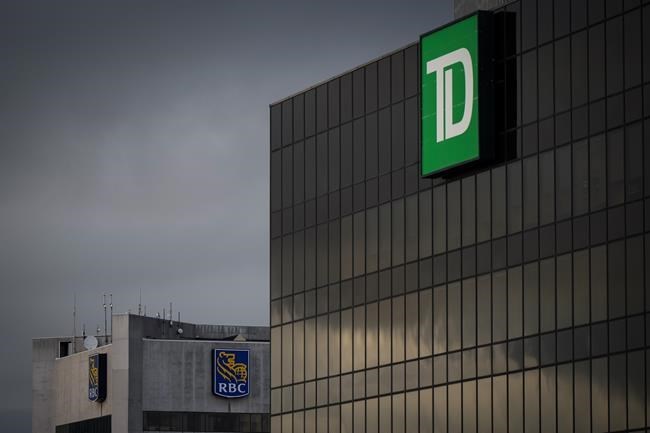TORONTO ŌĆö TD Bank Group's profits fell in the first quarter, following what's proved to be a trend among big banks in the quarter as they set aside more money for potentially tougher economic conditions ahead.
The bank's $690 million in provisions for credit losses, up from $72 million a year earlier, come as high interest rates raise concerns about pressure on borrowers and the chance of rising defaults.
Provisions, however, are so far more returning to average levels rather than illustrating any sharp deterioration in credit quality, said TD chief executive Bharat Masrani.
"As expected, we saw some credit normalization this quarter, but credit performance remained strong overall," he said on an earnings call Thursday.
Along with rising provisions for credit loss, profits at TD and other banks were also hit by rising expenses as inflationary pressures took hold. Banks also saw profits dip as new taxes on banks came into effect, while earnings for TD and CIBC were also lower because of major lawsuit settlements.
"There was a bit of noise," said Robert Colangelo, senior credit officer at Moody's, speaking about bank results generally in the quarter.┬Ā
"Adjusting for those, results were actually pretty strong."
TD, for example, reported a first-quarter profit of $1.58 billion, down from $3.73 billion a year earlier, as it took a number of one-time charges including the cost to settle a lawsuit related to the Stanford Financial Group Ponzi scheme.┬Ā
Adjusting out those one-time charges, its profit amounted to $4.16 billion for an eight per cent increase from a year earlier. Revenue totalled $12.23 billion, up from $11.28 billion a year earlier.
And while credit loss provisions spiked, they were in comparison to a quarter when banks were still unwinding an earlier build of provisions, making the contrast with this last quarter seem higher.
Provisions, while coming in higher than some analyst expectations, were lower than Colangelo expected given the economic outlook.
"While we think the macro-economic outlook is weakening, unemployment still remains relatively strong at five per cent, and so I think some of the inputs into their models aren't really generating the types of provisions that we would have expected," he said.
Expenses at TD rose 10 per cent as salaries and investments in technology especially weighed, while other banks reported expense increases of between the mid-single digits up to the 17 per cent RBC reported and that chief executive Dave McKay vowed to get a hold on.
TD's earnings were also affected by its $1.6-billion charge related to the Stanford Financial Group Ponzi scheme, which follows on major lawsuit settlements from CIBC this quarter and BMO last quarter.
The bank said Monday it would pay to settle a lawsuit for its alleged role in the Ponzi scheme, one of the largest ever orchestrated. In agreeing to the settlement, TD denied any liability or wrongdoing, saying it chose to settle the case to avoid the distraction of a long legal proceeding.
TD also had a loss in the quarter related to its deal to buy U.S. bank First Horizon Corp., the future of which became less clear after TD confirmed Thursday that it doesn't expect to get regulatory approval for the deal by the already extended May 27 deadline.
Masrani said very little on the call about a potential new timeline, or what about the regulatory process was slowing a potential approval, saying that they are in talks with First Horizon to extend the closing date window.
"I cannot speculate on when we will receive approval. I can tell you that we are fully committed to the transaction," he said.
TD closed its deal to U.S. investment bank Cowen Inc. on Wednesday.
Adjusting out the numerous one-time items, the bank's earnings came to $2.23 per diluted share, up from an adjusted profit of $2.08 per diluted share in its first quarter last year.
Analysts on average had expected a profit of $2.20 per share, according to estimates compiled by financial markets data firm Refinitiv.
TD's results beat expectations despite higher-than-expected provisions for credit loss, helped along by "very impressive margin expansion," said Scotiabank analyst Meny Grauman, even if the pace of growth is slowing.
"Margins look better here than at most peers, but expansion is slowing," he said in a note Thursday."We see limited upside to TD shares this morning as investors digest what the coming end of the margin expansion cycle will mean for the bank (and group)."
This report by The Canadian Press was first published March 2, 2023.
Companies in this story: (TSX:TD)
Ian Bickis, The Canadian Press



